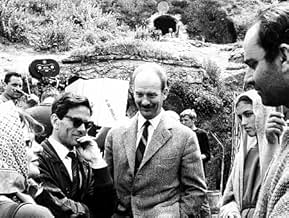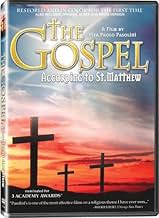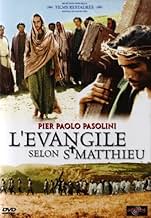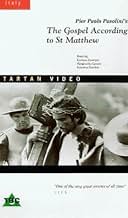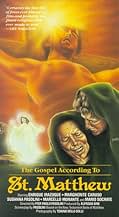La vie de Jésus-Christ selon l'Évangile de Matthieu. Pasolini montre le Christ comme un marxiste avant la lettre et utilise, pour ce faire, la moitié du texte de Matthieu.La vie de Jésus-Christ selon l'Évangile de Matthieu. Pasolini montre le Christ comme un marxiste avant la lettre et utilise, pour ce faire, la moitié du texte de Matthieu.La vie de Jésus-Christ selon l'Évangile de Matthieu. Pasolini montre le Christ comme un marxiste avant la lettre et utilise, pour ce faire, la moitié du texte de Matthieu.
- Réalisation
- Scénario
- Casting principal
- Nommé pour 3 Oscars
- 7 victoires et 9 nominations au total
- Caifa
- (as Rodolfo Wilcock)
Avis à la une
Pasolini's minimalist Jesus has an air of both humility and loftiness (as befitting one able to walk on water), but he is conspicuously lacking in emotion and expression. One might reply that Jesus (as God) doesn't share all our roller coaster emotions, but I see the New Testament Jesus as more of a Hamlet character, full of contradictory emotions. Pasolini's Jesus character's foreboding presentation could almost be seen as that of a young, conceited, dour, nihilistic Sophomore Philosophy student. A few quibbles: the Bible text describes large crowds of people following Jesus, but the movie only allows for a couple of dozen in most scenes. Also, in the movie, Jesus is often represented as preaching while he is walking, with his back turned away from his followers, who walk behind him. Finally, Mary the mother of Jesus is at most 20 when he is born, but she somehow becomes 70 years old during his ministry, when in fact she would have been only 50. With these reservations, then, I consider this the most successful Bible film I've seen.
Pasolini's Biblical adaptation of the Gospel of Matthew far surpasses present day movies of this genre in its overall effect on the viewer. The real substance of the film, the story of Jesus, is not glossed over with big budget extras, professional actors, and special effects which only seem to overshadow the awe inspiring wisdom of the words spoken by Jesus in the New Testament.
The fact that the actors are of Mediterranean decent only serves to make the film more believable. The costumes and settings appear to be more realistic than the Hollywood versions that I have seen in other Biblical films. The Jewish Church leaders with their alien looking hats show how detached and imposing these figures must have appeared to the common people of the time of Jesus. When Jesus threatens their positions of power by bringing God directly to the people without need of a temple or an interpreter it sheds light on how these leaders felt threatened by a "poor son of a carpenter".
Most films of this genre focus more on the Romans oppression of Jesus without showing the betrayal by the Jewish leaders that led to the unjust crucifixion of Jesus.
I highly recommend this film to anyone who has become bored with seeing the story of Jesus on film. If you think that you have seen it all and do not want to sit through yet another trumped up version of the story of Jesus then I suggest that you view this movie, for it succeeds where all others have failed.
This is such a stately, respectful, yet contemporary (and dare I say, Italian) production, in quiet black and white, it's hard to find fault with it. In some ways, I think it does exactly what it intends. It mixes long shots with close ups. It moves with clarity and sharp (no dissolve) cuts from face to face. It uses African-American gospel and Bach. It depends on solemnity, and it uses actors that have the faces, and demeanors, to be utterly solemn and strong.
All the actors are amateurs. Pasolini was an atheist. The triumph at the end is a matter of record. It's all here.
The question might be (for some) whether it is nevertheless a movie you want to watch. And I say, absolutely. You do have to like, or learn to like, movies that are about quiet ambiance, about passive expressions that say more than intense extroverted acting. The black and white photography, something of a throwback during this early 1960s production, gives it even more of the timeless, almost melancholy depth that keeps it going, owing something to the Dreyer's Joan of Arc, I think.
It's important to know this is not really an interpretation of the gospel, but a reading of it. The filming of course required actors, but it tries to be factually straight forward. That's incredibly hard to pull off without arrogance or religiosity. But Pasolini does it. The down side to this is that it's slow, or even (no sacrilege here), boring. I mean, I read the book.
For me, what makes it terrific is not only how it is filmed (the camera-work and editing) and the faces (all those faces, with the camera still and focused on them), but the sense of reality here. The holiness is removed, but not the sacred seriousness. It makes it seem possible in a very real way. The people, the places, all of it is not historic, not in particular, but the effect, the mood, the force of it all is profound. Even for a non-believer. It's quite something to get swept into.
Le saviez-vous
- AnecdotesPier Paolo Pasolini used non-professional actors and cast local peasants, shopkeepers, factory workers, and truck drivers. For Mary at the time of the Crucifixion, he cast his own mother Susanna Pasolini.
- GaffesWhen they are taking Christ down from the cross, in the distance you can see a car driving around a corner.
- Citations
[last lines]
Christ: All authority has been given to me in heaven and earth. Go, therefore. And make disciples of all nations, baptizing them in the name of the Father, and of the Son and the Holy Ghost, teaching them to observe everything I have commanded you. And behold. I am with you always even unto the end of the world.
- Versions alternativesThe 2007 DVD release features a colorized, English-dubbed version with a run time of 91 minutes and an Italian-language black and white version running 136 minutes.
- ConnexionsEdited into Histoire(s) du cinéma: Une histoire seule (1989)
- Bandes originalesMatthäus Passion (BWV 244)
Written by Johann Sebastian Bach
nr 78: Wir setzen uns mit Tränen nieder
nr 47: Erbarme Dich (musical intro)
Meilleurs choix
- How long is The Gospel According to St. Matthew?Alimenté par Alexa
Détails
- Date de sortie
- Pays d’origine
- Langue
- Aussi connu sous le nom de
- El Evangelio según san Mateo
- Lieux de tournage
- Castel Lagopesole, Avigliano, Basilicata, Italie(Sanhedrin trial of Jesus, in castle's courtyard)
- Sociétés de production
- Voir plus de crédits d'entreprise sur IMDbPro
Box-office
- Montant brut mondial
- 16 572 $US
- Durée2 heures 17 minutes
- Couleur
- Mixage
- Rapport de forme
- 1.85 : 1
Contribuer à cette page



